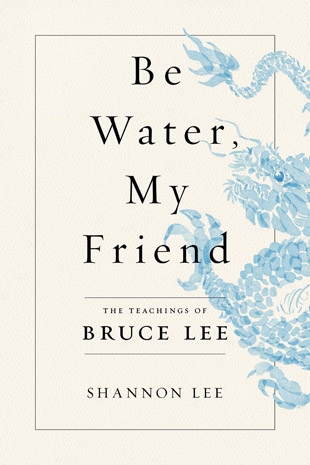Shannon Lee is the CEO and owner of the Bruce Lee Family Companies and chairperson of the Bruce Lee Foundation. Although her father, the legendary martial artist, died when she was only four years old, she has assimilated and made accessible his world-famous philosophy.
This book contains the tools whereby we can "sculpt" our inner selves and become all we are meant to be. Or as Lee put it:
"The good life is a process, not a state of being. It is a direction, not a destination."
Lee was a disciplined student; everything he learned was through the martial arts which gave him a clear mind and a poised body. Shannon Lee notes that he not only sculpted his body, he shaped his mind, "educating himself, evolving his practices, developing his potential. He also worked at the little things, like having beautiful handwriting, writing and speaking grammatically well," and more. As he developed his philosophy, he applied it to his everyday life.
Shannon Lee does a masterful job explaining the Water Way which entails being aware, pliable, purposeful, and whole. If you want to see just what this means, watch some Bruce Lee films. Or listen to this summary from his daughter:
"At its essence, water flows. It finds its way around (or even through) obstacles. My father would call this having 'no limitations.' Water is present to its circumstances and surroundings and therefore ready to move in any direction that allows it passage. That openness and pliability means it is in a constant state of readiness, but a natural readiness because it is simply being wholly itself. To be like water, then, is to realize your most whole, natural, and actualized self where you are living as much as possible in the slipstream of life as your forge your own way forward."
This philosophy challenges us to practice choiceless awareness and stop making everything and everyone right or wrong. Bruce Lee explained:
"Do not condemn; do not justify. To truly understand there must be . . . no sense of comparison or condemnation, no waiting for a further development of the thing we are talking about in order to agree or disagree."
To practice this balanced perspective is very difficult in a culture where adversarial thinking, judgmentalism, and the blame game are so predominant.
This small volume is so packed with spiritual advice — "have appropriate tension," "be purposeful," "research your own experience (see excerpt)" — that it is hard to summarize. In a chapter on "The Tools" Shannon defines kung fu as "skill achieved through hard work and discipline." Although associated with martial arts, it can be applied to any endeavor. So could the tools explained here: Take Aim, Take Action, Affirm, Be Symbolic, Journal, and Get Physical.
To illustrate these and many other concepts, Shannon relates stories from her father's life and career. It's clear she has great respect for his practice of lifelong learning and openness. And after reading this book, so do we.
